sanct-, sancti-
(Latin: sacred, holy; religious)
sanctiloquence
Speaking solemnly (reverently, devoutly) about sacred or holy things.
sanctiloquent
1. Discussing or delivering a formal treatment of holy or sacred topics in a speech or writing; such as, a sermon or a dissertation.
2. A presentation about heavenly or holy things; usually, in a sacred manner.
2. A presentation about heavenly or holy things; usually, in a sacred manner.
sanctimonial
An obsolete term pertaining to holiness.
sanctimonious (sangk" tuh MOH nee uhs) (adjective), more sanctimonious, most sanctimonious
1. A reference to someone who is holy in character or sacred and consecrated: Mark and his family are devoted and sanctimonious people who go to church every Sunday.
2. Descriptive of a person's attitude or expression which reveals an exaggerated show of holiness or moral superiority; excessively or hypocritically pious: Adam had a sanctimonious smile as he praised Mary's efforts to teach their son to become much better behaved than all of the other children in his school.
3. Characteristic of an individual who is pretentiously righteous, hypocritically pious, or feigning piety: Matthew was just a sanctimonious politician who, like so many others, was trying to fool the voters into believing that he was 100% sinless and honest.
4. Etymology: from Latin: sanctimonia, "holiness, sacredness."
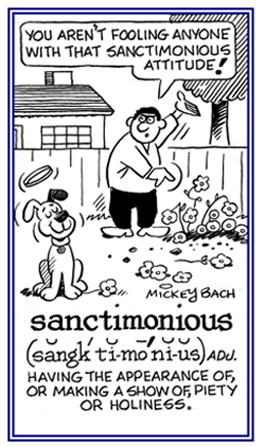
© ALL rights are reserved.
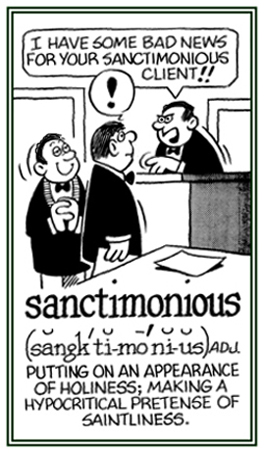
© ALL rights are reserved.
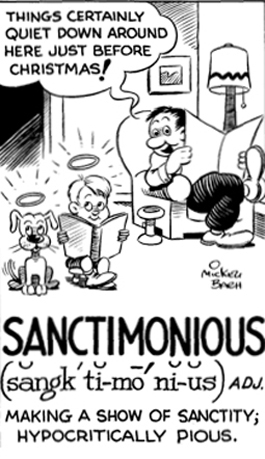
2. Descriptive of a person's attitude or expression which reveals an exaggerated show of holiness or moral superiority; excessively or hypocritically pious: Adam had a sanctimonious smile as he praised Mary's efforts to teach their son to become much better behaved than all of the other children in his school.
3. Characteristic of an individual who is pretentiously righteous, hypocritically pious, or feigning piety: Matthew was just a sanctimonious politician who, like so many others, was trying to fool the voters into believing that he was 100% sinless and honest.
4. Etymology: from Latin: sanctimonia, "holiness, sacredness."



sanctimoniously (adverb)
A reference to someone who pretends or fakes piety or righteousness.
sanctimony (s) (noun), sanctimonies
1. A religious holiness of life and character.
2. A pretended, affected, or hypocritical holiness or saintliness.
3. Etymology or origin: from Latin sanctimonia, "holy."
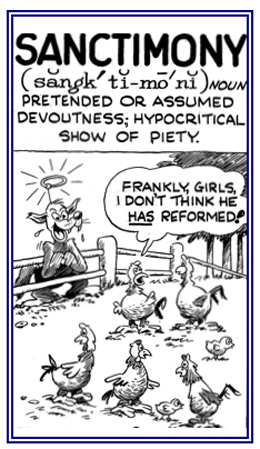
© ALL rights are reserved.
Go to this Word A Day Revisited Index
2. A pretended, affected, or hypocritical holiness or saintliness.
3. Etymology or origin: from Latin sanctimonia, "holy."

Go to this Word A Day Revisited Index
so you can see more of Mickey Bach's cartoons.
sanction (Janus word)
To allow plus to prohibit or to punish.
1. In law, something that is extended to include a provision of rewards for obedience, along with punishments for disobedience, to a law.
2. In politics, economic or military action taken by a state or alliance of states against another as a coercive measure; usually to enforce a violated law or treaty: The international community imposed sanctions on a country for its illegal political actions.
3. An encouragement given, intentionally or otherwise, to an opinion or practice by a person of influence: The President's apparent sanction encouraged the politician to continue running for Congress.
4. Something which serves to support, authorize, or to confirm an action, procedure, etc.: Sanctions against another country have been lifted.
2. In politics, economic or military action taken by a state or alliance of states against another as a coercive measure; usually to enforce a violated law or treaty: The international community imposed sanctions on a country for its illegal political actions.
3. An encouragement given, intentionally or otherwise, to an opinion or practice by a person of influence: The President's apparent sanction encouraged the politician to continue running for Congress.
4. Something which serves to support, authorize, or to confirm an action, procedure, etc.: Sanctions against another country have been lifted.
To impose sanctions upon a person or a nation in order to penalize; such as, something is taken or an order that is given to force a country to obey international laws by limiting or stopping trade with that country, by not allowing economic aid, etc.; usually, expressed as "sanctions against" or "imposing sanctions.
Beijing calls Taiwan deal a "gross intervention" and applies unusual sanctions.
The Chinese government has announced a broad series of measures in retaliation for new U.S. weapons sales to Taiwan, including the unusual step of imposing sanctions on American companies that supply the weapons systems.
sanction (verb), sanctions; sanctioned; sanctioning
1. To ratify or to confirm by an authorized enactment: The President sanctioned restrictions to other countries regarding certain products to the United States.
2. To indicate an action that is authorized by a government agency: The government has sanctioned the use of force in stopping imports of specific items from other countries.
3. To allege or to justify something as being permissible: The plan to lower prices for certain items was sanctioned by the board of directors of Sam's company.
4. To enforce a law, a legal obligation, etc. by attaching a penalty for some kind of transgression: The President is sanctioning the permission of refugees from other countries to enter the U.S.
5. Etymology: from Latin sanctionem, "the act of decreeing or ordaining" from sancire, "to decree, to confirm, to ratify."

© ALL rights are reserved.
Go to this Word A Day Revisited Index
2. To indicate an action that is authorized by a government agency: The government has sanctioned the use of force in stopping imports of specific items from other countries.
3. To allege or to justify something as being permissible: The plan to lower prices for certain items was sanctioned by the board of directors of Sam's company.
4. To enforce a law, a legal obligation, etc. by attaching a penalty for some kind of transgression: The President is sanctioning the permission of refugees from other countries to enter the U.S.
5. Etymology: from Latin sanctionem, "the act of decreeing or ordaining" from sancire, "to decree, to confirm, to ratify."

Go to this Word A Day Revisited Index
so you can see more of Mickey Bach's cartoons.
sanctionary
Relating to sanctions:
- Official permission or approval for a course of action; such as, unable to proceed without the sanction of the board.
- Something that serves as approval or encouragement; for example, social acceptance or custom.
- A law or rule that leads to a penalty being imposed when it is disobeyed.
- A punishment imposed as a result of breaking a law or rule.
- A measure taken by one or more nations to apply pressure on another nation to conform to international law or opinion; such as, imposed trade sanctions.
- An ethical principle or consideration that determines or influences someone's conduct.
sanctitas, scientia, sanitas
Holiness, knowledge, health.
Motto of Marywood University, Scranton, Pennsylvania, USA.
sanctity
1. Holiness of life, saintliness; the rank of a (canonized) saint.
2. The quality of being sacred or hallowed; sacredness, claim to (religious) reverence; inviolability.
3. Something thought to be sacred.
2. The quality of being sacred or hallowed; sacredness, claim to (religious) reverence; inviolability.
3. Something thought to be sacred.
sanctorium
A shrine, a sacred or holy place, a temple.
sanctuarize
To afford sanctuary to; to shelter by means of a sanctuary or sacred privileges.
1. A building or holy place set apart for the worship of God or of one or more divinities: Examples of sanctuaries include the Christian church, the Jewish temple and the Mosaic tabernacle, a heathen temple or site of local worship, and the like; also figuratively, the church or body of believers.
2. An area of land or a building specified for wild animals or plants where they are protected from hunting or maltreatment and encouraged to breed or to grow: Judy loved to go to the bird sanctuary close to her home where she could listen to and view all the different kinds of birds where they were safeguarded from danger and pollution.
3. Etymology or origin: from Latin sanctimonia, "sacredness" from sanctus, "holy."
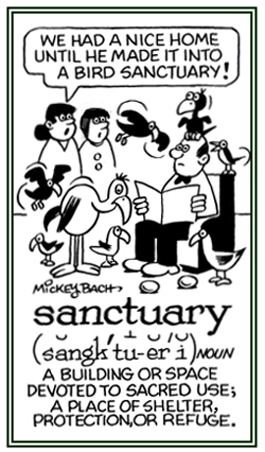
© ALL rights are reserved.

© ALL rights are reserved.
Go to this Word A Day Revisited Index
2. An area of land or a building specified for wild animals or plants where they are protected from hunting or maltreatment and encouraged to breed or to grow: Judy loved to go to the bird sanctuary close to her home where she could listen to and view all the different kinds of birds where they were safeguarded from danger and pollution.
3. Etymology or origin: from Latin sanctimonia, "sacredness" from sanctus, "holy."




